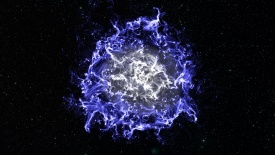Difference between revisions of "Finnean Convergence Zone"
Greenfelt22 (talk | contribs) |
Greenfelt22 (talk | contribs) |
||
| Line 11: | Line 11: | ||
=Background= | =Background= | ||
| − | Following Starfleet's agreement to construct [[Deep Space 15]] in orbit of [[Finnea Prime]], various starships began to explore the sector, focusing particularly on the [[Moray Nebula]]. The USS Vasco de Gama was the first to detect the Convergence Zone and catalog it. | + | Following Starfleet's agreement to construct [[Deep Space 15]] in orbit of [[Finnea Prime]], various starships began to explore the sector, focusing particularly on the [[Moray Nebula]]. The [[USS Vasco de Gama]] was the first to detect the Convergence Zone and catalog it. |
Noting the anomaly featured many characteristics as the fabled [[memoryalpha:Delphic Expanse|Delphic Expanse]] from the 2150s, the Vasco de Gama did not attempt to enter. In fact, shortly after arrival, an starship emerged from the expanse which quickly sounded a distress beacon. The Vasco de Gama attempted to come to the ship's aid, only to find that every evidence of biological material melted as if touched by warp plasma coolant. Nothing aboard the ship survived. | Noting the anomaly featured many characteristics as the fabled [[memoryalpha:Delphic Expanse|Delphic Expanse]] from the 2150s, the Vasco de Gama did not attempt to enter. In fact, shortly after arrival, an starship emerged from the expanse which quickly sounded a distress beacon. The Vasco de Gama attempted to come to the ship's aid, only to find that every evidence of biological material melted as if touched by warp plasma coolant. Nothing aboard the ship survived. | ||
Revision as of 08:42, 8 April 2017

| |
| Finnean Convergence Zone | |
| Location: | |
| Size: |
20,000 AUs |
| Territory: |
Independent |
| Template:Space | |
The Finnean Convergence Zone was discovered in 2371 by the USS Vasco de Gama.
Background
Following Starfleet's agreement to construct Deep Space 15 in orbit of Finnea Prime, various starships began to explore the sector, focusing particularly on the Moray Nebula. The USS Vasco de Gama was the first to detect the Convergence Zone and catalog it.
Noting the anomaly featured many characteristics as the fabled Delphic Expanse from the 2150s, the Vasco de Gama did not attempt to enter. In fact, shortly after arrival, an starship emerged from the expanse which quickly sounded a distress beacon. The Vasco de Gama attempted to come to the ship's aid, only to find that every evidence of biological material melted as if touched by warp plasma coolant. Nothing aboard the ship survived.
The Vasco de Gama continued to study the anomaly, even to the point of making first contact with the Chabanlons, a planet residing just outside the Convergence Zone. Under guidance from the Chabanlons, who had several times attempted to study the anomaly themselves, the Vasco de Gama planted warning beacons around the anomaly, warning any starship coming through the area not to enter.
Behavior & Features
The Vasco de Gama has fired probe after probe into the Convergence Zone, each time telemetry not lasting for more than a thousand Astronomical Units. Although the telemetry was always received in fragmented fashion, the Vasco de Gama has been able to determine that multiple spatial phenomena reside inside the zone including:
- White Holes
- Black Holes
- Occasional detection of Chroniton Particles.
- Evidence of lifeforms
- Evidence of planets
- Subspace eddies and fissures
Without complete data, it is nearly impossible to determine exactly what is happening inside the zone.
Known Species & Lifeforms
| FINNEAN CONVERGENCE ZONE | |
| FINNEA SECTOR | Finnea Prime • Deep Space 15 • Finnean Convergence Zone • Map of the Zone Rakhar • Chamra Vortex • Raey • Moray Nebula • Bellogeer VI |
| PLANETS & SYSTEMS | Alpha Trios • Kalisa Sector • Time Warp Nebula • Penduli V |
| BEYOND THE ZONE | Aten II • Aketi • Boreriri • Guardians • Triosians • Followers of Dolmoqour • Dolmoqour |
| THE MYSTERY... | Great Conflict |